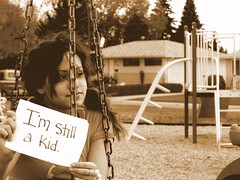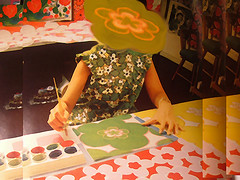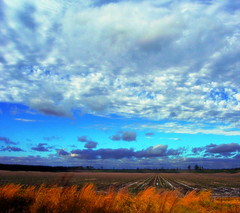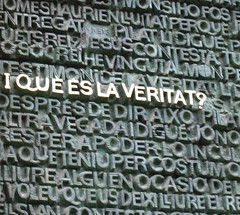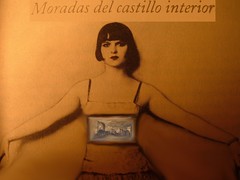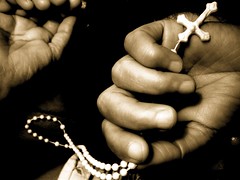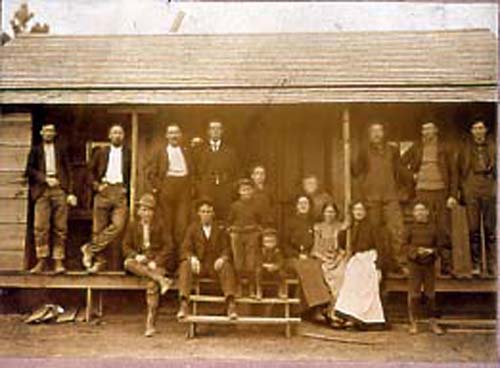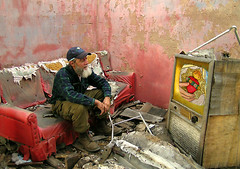 TV room
TV room
Originally uploaded by reddirtrose. An article culled from Arts and Letters Daily caught my attention today and set me spinning off into weird habit #3, otherwise known as "ranting and raving". Once I get some abstruse point on my mind, I harangue everyone around me until they finally get it through my head THEY DON'T CARE, or I just wear myself out--whichever comes first.
This particular episode of ranting was triggered by the social conservative, Theodore Dalrymple. Though I am often at odds with Dalrymple, he rattled my bones and my equally brittle assumptions with this piece. Having gone through the files of dozens of Australian murder cases, he invokes a stunningly repetitious picture:
The homes in which the murders took place - and here I am speaking of what James Thurber might have called naive, domestic little murders - have, from the photographic evidence, a terrible similarity. There is the same narrow hallway, with the same detritus strewn in it.
Into the living-room through the door on the right: the same gas fire, but above all, and always, the prominence of the video machine, which is to the British home at the lower end of the social scale what the icon was in the Russian muzhiks izba: the focus of the household's spiritual life, if spiritual is quite the word I seek. A Martian visitor might take it as an object of religious veneration or propitiation, so dominant is it in the room.
Strewn on the floor, there are always several videotapes, probably just watched: these are the homes in which the television or video is never switched off so long as there is someone awake in the house. There are also many more videos on shelves in every room throughout the house, for images of a pseudo-reality mean more to the inhabitants than most of life as they actually live it.
Some wise person said that in every heart there is an altar, and similarly in every home, there is an area that is by its central location or its surrounding radiance, and the reverence with which it's looked upon, a focal point, an altar. In ancient times, it was quite simply a fire, a contained flame where you could look for hours and see survival, warmth, beauty. If the altar is a video screen that regularly flashes scenes of violence and lust, ego and passions, untempered by wisdom, then clearly the worshippers at this particular altar are in trouble.
And if a society is composed of rows and rows of houses on rows and rows of streets all worshipping at the same empty home altar, then that is an impoverished society, indeed, no matter what the GNP might say.
When I look back on all these murders and murderers, what do I feel? And do I remember the murderers as evil men, who joyfully did what they knew to be wrong and were prepared to take the consequences, even as they tried to avoid them? Did they all have black hearts upon which murder had been inscribed since birth? No. I am overwhelmed by a sense of the unfitness for life of all the participants in these sordid dramas: their main problem was that they had not the faintest idea how to live and yet - this is the hallmark of modernity - they were plentifully supplied with ego.
They had received no guidance from religion, naturally enough, since God is dead for them, and never has been very much alive. As for social convention, it has not so much been destroyed as turned inside out. The poor who once prided themselves on such things as respectability, cleanliness, honesty, orderliness and thrift, often in the most difficult circumstances, now pride themselves on their bohemianism. Disorder and chaos are a metonym for freedom and authenticity. But they are bohemians without being artistic, and the result is a squalor scarcely credible in times of supposed prosperity.
There's an uncomfortable tinge of snobbery here. Surely, murders are committed in orderly homes with framed Matisses on the walls, as well as in the dumps inhabited by poor slobs who think they're bohemians. (And really are drunken slobs who call themselves 'bohemians' any more worhty just because they're artists? But I am particularly disconcerted by the prominence of the VCR and TV--partially, because it enjoys a pretty central location in my own home. Right where the fire would have been in an ancient hut.
In my previous post, I spoke of the best fiction as an exercise in revealing truth through metaphor. Similarly, whatever we exalt on our own personal home altar, must be capable of rendering truth and wisdom to those who gather around to venerate it. Religions of all kinds, whether you believe they are literally true or whether you see them as beautiful myths and metaphors have provided answers to every question the human heart can pose. Listened to with an open mind and without distortions, they calm and elevate the heart, and call the worshipper not to BECOME his passions, but to shape, use and ultimately transcend them.
The exceptions and there are tragically many, are those who have not heard the message they claim to exalt. Suicide bombers creating devastation in defense of a religion of peace. Christians who relegate people who are often kinder and in all ways better disciples than they are to "a lake of fire", simply because they haven't pronounced the right words.
And yet the great religions do not fail. People fail. Meanwhile, all the noble faiths keep their bargains with those who are willing to raise up an altar in the heart: When you need guidance, you will have it, when you seek mercy, it will be yours; when you are in pain, you will find comfort, and perhaps most important of all: when you are overwhelmed by the miserable delusion of your own importance, we will remind you how small you are. And how loved.
If we as a society, really think we can live without all that, we'd better find a better home altar than the television set or the VCR with its endless images of egos gone wild to replace it. (Or maybe I'm just getting old and cantankerous. Always a possibility when I start in on a good rant and rave.)
So to summarize today's rant: You better start believing in something higher than yourself, whether it's God or Socratic principles or the sanctity of nature, and whatever it is, you better teach your children to honor it. If you don't, you just may end up raising a pack of selfish morons. Who knows? You may even become one yourself. (Is there a test for this on one of those quiz sites?) (If so, I'm heading there immediately.)

